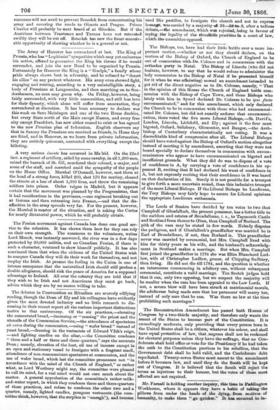The debates in Convocation on Ritualism are scarcely edifying reading,
though the Dean of Ely and his colleagues have evidently given the most devoted industry and no little research to dis- cussing in their recent report all the various important distinctions native to that controversy. Of the six practices,—elevating the consecrated bread,—incensing or "ceasing" the priest and the utensils of the Communion Service,—the attendance of spectators ab extra daring the communion,—using "wafer bread " instead of yeast bread,—dressing in the vestments of Edward VIth's reign, —and lighting candles on the altari—the Committee condemn "three and a half or three and three-quarters," says the accurate Dean ; namely, elevation of the host, all use of incense except in an open and stationary vessel to fumigate with a fragrant smell, attendance of non-communicant spectators at communion, and the use of wafer bread, which last the committee pronounce not "in accordance with the mind of the Church of England," or rather what, as Lord Westbury might say, the committee were pleased to call its mind, for a real mind would not care much about the matter. A general approbation of the committee's rather milk- and- water report, in which they condemn three and three-quarters of these practices, and refuse to condemn the other two and a quarter, namely, lighted candles, pompous vestments (the com- mittee think, however., that the surplice is "enough"), and incense
used like pastilles, to fumigate the church and not to express homage, was carried by a majority's,. 30-3d te 8, after a tedious debate,—the amendment, ,Which was rejected, being in favour of trying the legality of the ritualistic practices in a court of law, which the committee opposed.






























 Previous page
Previous page